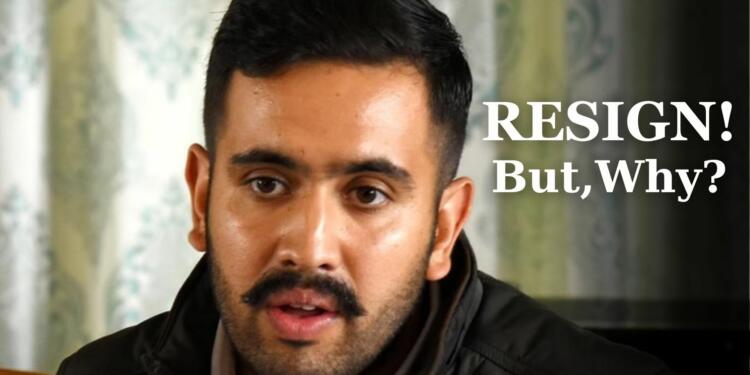Vikramaditya Singh’s resignation as the Public Works Minister in Himachal Pradesh comes amid mounting dissatisfaction with Chief Minister Sukhwinder Singh Sukhu’s leadership. Against the backdrop of recent political setbacks, including the embarrassing defeat of the party’s Rajya Sabha candidate, Singh’s departure underscores internal rifts within the Congress party. His decision reflects broader discontent within the state government and highlights challenges facing the party as it grapples with maintaining unity and electoral credibility in Himachal Pradesh.
Who is Vikramaditya Singh?
Vikramaditya Singh hails from a prominent political family in Himachal Pradesh. He is the son of Pratibha Singh, a senior leader in the Indian National Congress, and the late former Chief Minister Virbhadra Singh, who served multiple terms in office. This lineage places him firmly within the political landscape of the state, with deep-rooted connections and influence.
In a notable departure from party lines, Vikramaditya Singh recently defied the Congress leadership’s stance on the Ram Temple consecration ceremony in Ayodhya. His participation in the festivities, despite the Congress party’s official position, underscored his willingness to assert his individual beliefs and preferences, even if they diverge from the party’s stance.
Additionally, Vikramaditya Singh holds the unique title of being the titular king of the erstwhile princely state of Bushahr. This historical background adds another layer to his identity and influence in Himachal Pradesh politics, connecting him to the region’s rich cultural and political heritage.
Educationally, Singh studied history at Delhi’s prestigious St. Stephen’s College, indicating a background that blends academic rigor with political heritage, further enhancing his credentials in the political arena.
Why Resignation?
Vikramaditya Singh’s resignation as the Public Works Minister in the Himachal Pradesh government stems from several key factors. Firstly, he asserts that the voices of Congress MLAs were stifled within the government, indicating a perceived lack of inclusivity and consultation in decision-making processes. This suggests a broader dissatisfaction among party members with the functioning of the administration under Chief Minister Sukhwinder Singh Sukhu’s leadership.
Furthermore, Singh’s emotional response to the government’s failure to allocate space for his late father’s statue highlights the personal and political significance of this issue. It symbolizes a perceived lack of recognition and respect for the contributions of his family within the party and the state’s political history. This sentiment likely contributed to his decision to resign, reflecting a broader disillusionment with the party’s leadership and priorities.
The resignation of Vikramaditya Singh has significant implications for the internal dynamics of the Congress party in Himachal Pradesh. It exposes underlying rifts between factions loyal to CM Sukhwinder Singh Sukhu and state unit chief Pratibha Singh, exacerbating existing tensions within the party. This rift could potentially deepen in the aftermath of Singh’s resignation, leading to further fragmentation and instability within the party ranks.
Political Fallout and Speculations
Vikramaditya Singh’s resignation has the potential to destabilize the Himachal Pradesh government, given the already fragile internal dynamics within the Congress party. His departure from the cabinet signifies a loss of confidence in Chief Minister Sukhwinder Singh Sukhu’s leadership and could lead to further defections or dissent within the party ranks. This, in turn, could jeopardize the stability of the government and its ability to effectively govern the state.
Furthermore, Singh’s resignation poses challenges for the Congress party’s future prospects in Himachal Pradesh. The internal rifts exposed by his departure highlight broader issues of leadership and governance within the party, which could erode its electoral appeal and weaken its position in the state. The party may struggle to regain public trust and cohesion, especially with the upcoming elections looming on the horizon.
Also Read: From Unity to Fragmentation: The Demise of the INDIA Alliance
BJP’s Reaction
The BJP’s response to Singh’s resignation reflects their anticipation of potential political gains from the upheaval within the Congress party. By meeting with the Governor and expressing apprehensions about possible actions by the Assembly Speaker, the BJP aims to capitalize on the internal turmoil within the ruling party. They may seek to exploit the situation to their advantage, either through defections from the Congress or by positioning themselves as a viable alternative to the current government.
The BJP’s concerns about the implications for the upcoming budget session highlight their strategic calculations regarding the legislative agenda and their own political objectives. They are wary of any attempts by the Speaker to suspend BJP MLAs or disqualify Congress legislators, which could impact their ability to influence legislative outcomes and shape public discourse in the state.
Response from The High Command in Congress
The role of the high command in the Congress party is crucial in resolving the crisis triggered by Singh’s resignation. As the ultimate decision-making authority, the high command must navigate the competing interests and factions within the party to restore stability and unity in Himachal Pradesh. Their intervention is necessary to address the grievances raised by Singh and other dissatisfied party members and to chart a course forward for the party in the state.
The high command’s decisions will determine the fate of Chief Minister Sukhwinder Singh Sukhu and the broader leadership structure within the Congress party in Himachal Pradesh. They must balance the need for accountability and reform with the imperative of preserving party unity and electoral viability. Ultimately, their ability to effectively manage the crisis and address the underlying issues will shape the Congress party’s future trajectory in the state.
In conclusion, Vikramaditya Singh’s resignation unveils deep-seated discontent within the Congress party in Himachal Pradesh, fueled by leadership challenges and personal grievances. This move amplifies existing factionalism and jeopardizes the government’s stability. The BJP eyes political opportunities amidst this turmoil, while the Congress high command faces a pivotal role in resolving internal strife and restoring electoral credibility. The outcome will determine the party’s trajectory in the state, shaping its future prospects significantly.
























